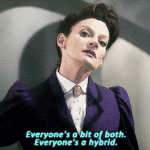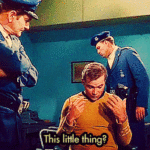Sherlock hears Watson’s nightmares for the first time maybe only a week or two after he moves in. He hears that harsh, unnatural sound from upstairs and looks up at the ceiling, so startled at such a strange noise that at first he does not understand that it comes from Watson himself.
Watson may be a strong man with steady hand by day but the blood-stained landscapes of India and Afghanistan are not scenes easily left behind, least of all by a man who still carries the weight of the wars in the aches of a gun shot wound in his shoulder and the pains of another man’s injury in his thigh. Sherlock has seen enough of the cruelties of mankind to know that the atrocities men visit upon one another are not lightly put aside, particularly in the vulnerable abyss of one’s sleep-soft mind.
He goes to the bottom of the stairs and waits. Though he is not wed to the rules and regulations of propriety, there is something about entering another man’s private room while he is exposed, in sleep and in terror, that makes him hesitate.
Watson, in particular, is no ordinary character in the great cast on life’s stage and Sherlock would not end his act too early through embarrassing presumptions if he could at all avoid it.
The cry sounds again, choked and wounded.
He climbs the stairs.
Watson’s room is dark and thick with the sound of his ragged breathing. Sherlock can just make out his figure on the bed, flat on his back, fists clenching at the blankets. He makes a noise near to whining.
“Watson,” Sherlock calls out quietly, “Watson, wake up.” There’s no response other than a gasping, wrenching sound. “Watson. John. John.”
Across the room John flies up into a sitting position, chest heaving under his sweat-soaked night shirt, “Who–Who is there? Sherlock?”
Sherlock takes a half-step forward at his name, his heart beating against his ribs at the sound of it spoken in the small rasp of his friend’s voice. “Yes. I heard–you sounded–” He struggles for an appropriate word and finds none.
John falls back onto his pillow, waving his hand. “It’s fine, I know how I sounded,” he says. The ends of his mustache, unwaxed and soft, sit curiously around his mouth when he speaks. “Thank you.”
Sherlock clears his throat. “I’ll just–I’ll be in the sitting room for at least an hour yet,” he offers, “if there is any way I can be of assistance.”
There is a weighty pause as John stares at him across the room and for a moment Sherlock thinks he is going to ask him to stay. He would, if John asked it of him. He would sit upon the floor as he did when he was a small boy and watch John settle back into bed with that strange exhaustion that comes from being woken unexpectedly in the night. Perhaps he could tell him about the experiment abandoned on the table downstairs to soothe his thoughts into something less troublesome, or perhaps they could discuss the latest issue of The Strand, or even the upcoming performances at Royal Albert Hall. He would stay, and sit, and speak in low tones until John relaxed again and fell back into a hopefully more peaceful sleep.
But John only says, “Good night, Holmes,” in a softer voice, the likes of which reminds Sherlock of a far more intimate relationship than two bachelors sharing a set of rooms. Sherlock flushes and believes them both to be grateful for the dark.
“Good night, Watson,” he says, and minutes later as he takes up his experiment again, Sherlock thinks if there were ever going to be a man worth the risk of unmasking himself on the chance he might be reciprocated, a man worth his life and livelihood, that Sherlock has just left him in the bed upstairs.
the thing about shakespeare is that when it’s done right, when it’s done well, it should sound like it’s coming from the soles of your shoes, being dredged up from the dark places in your lungs and exhaled in a rush, before it burns your mouth. There are pauses, swallows, reverberations, inflections, because how else are you to laugh and sing and snarl and spill forth these lines?
shakespeare done well by actors who know what they’re doing stops sounding like shakespeare. It slips inside your blood, inflects you brain, raging through your system until this is the only language you have ever known, will ever need. It makes the theater the world entire.
shakespeare should sound like lightning; it should turn the air silver.
and once you’ve witnessed that, it’s hard to accept anything less.






































